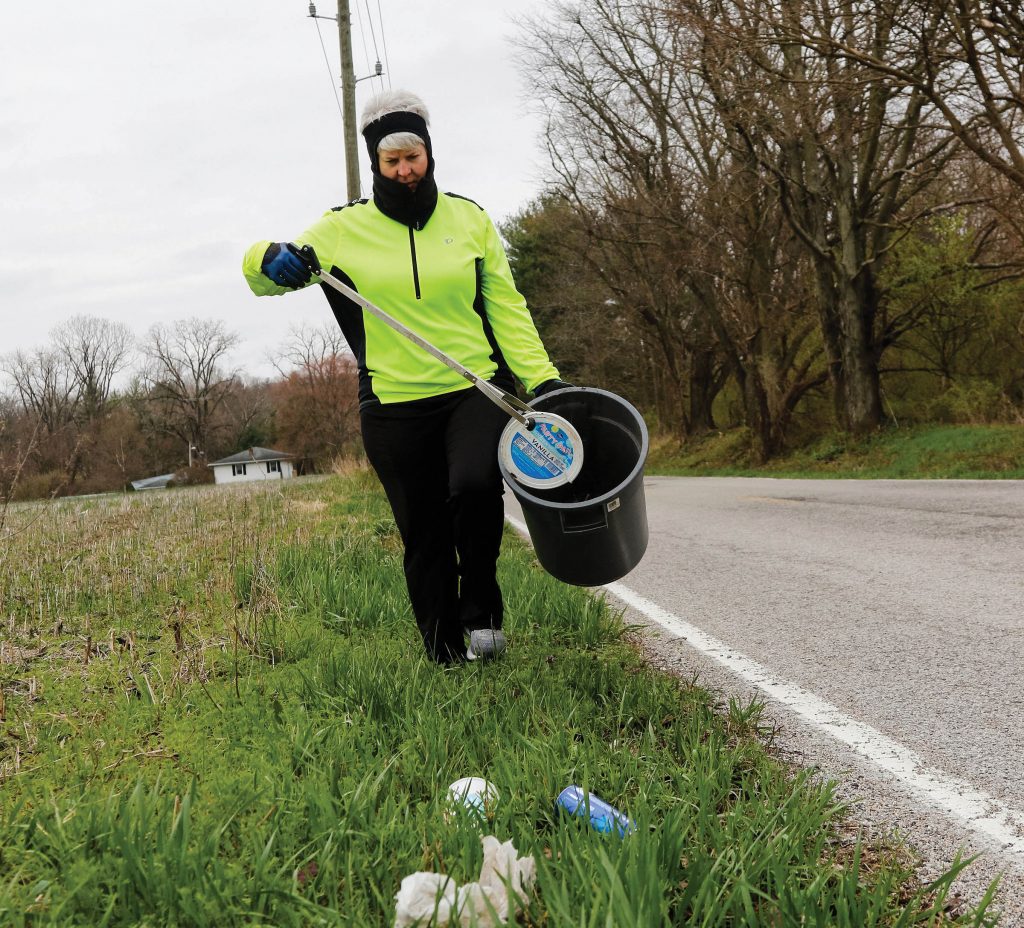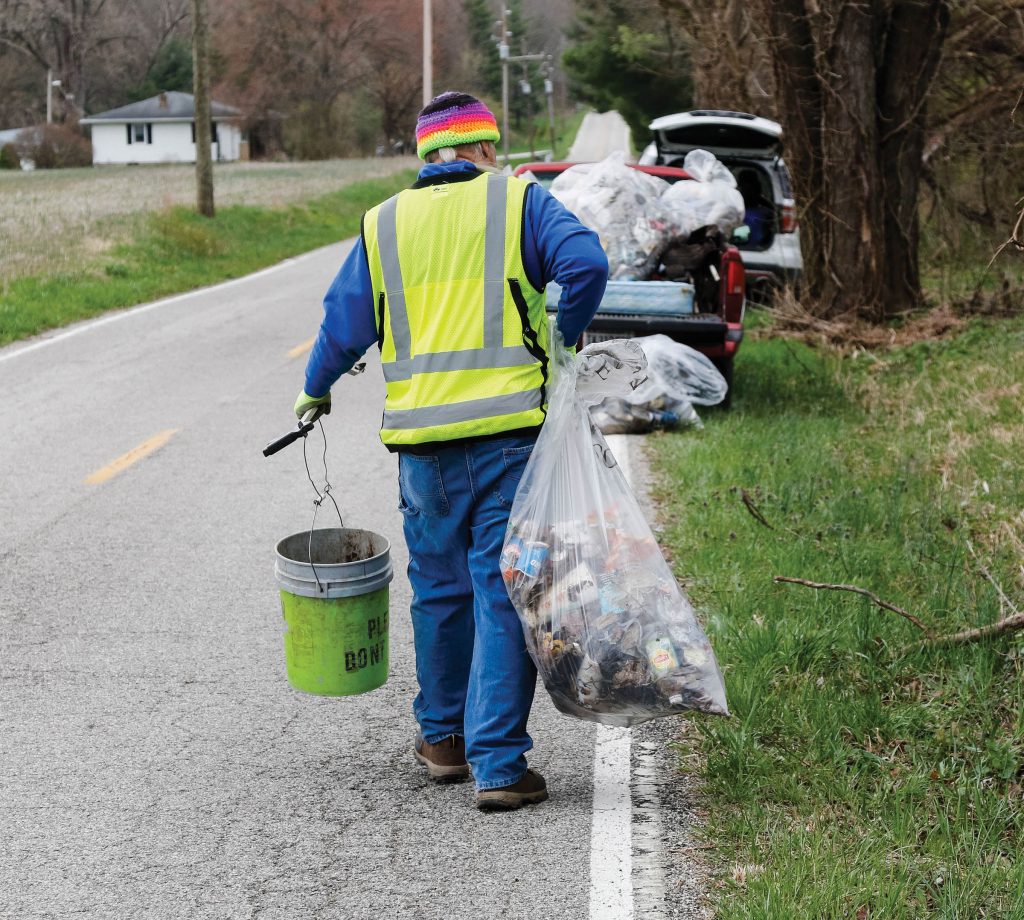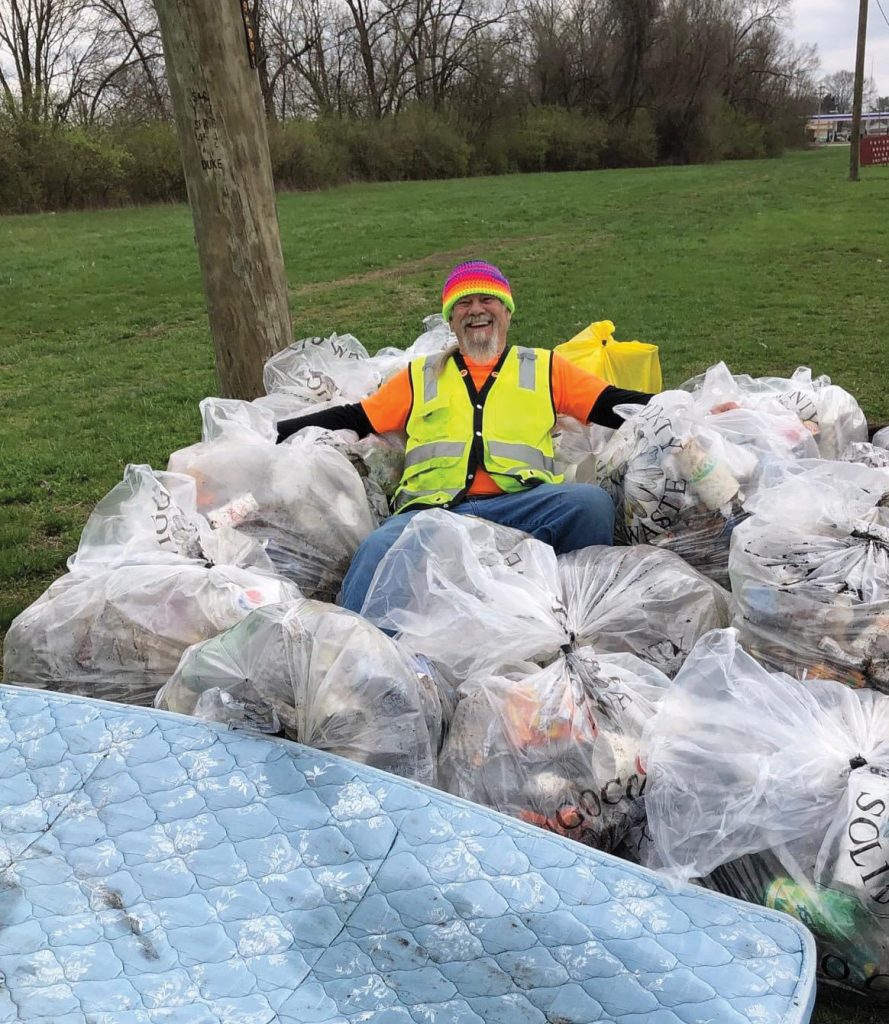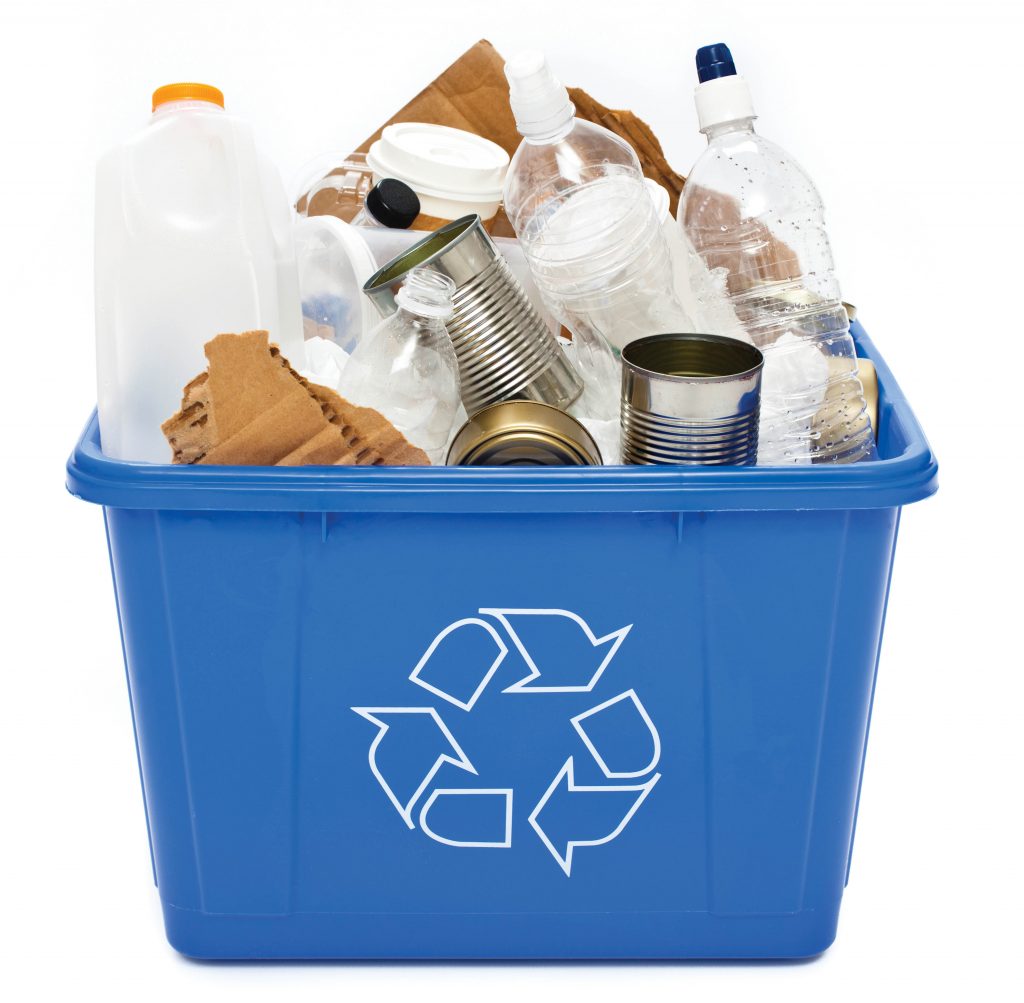
By Richard G. Biever
This year marks a half century since the nonprofit organization Keep America Beautiful first aired an unforgettable and now iconic ad campaign. The ad depicted a Native American in full buckskin paddling a canoe through a modern world of polluted water, air and land. “Some people have a deep, abiding respect for the natural beauty that was once this country …,” a deep voice-over intoned. As he then stood on the shoulder of a busy highway, a paper bag was tossed from the window of a passing car that hit the pavement in front of him; its contents scattered onto his moccasins. “… And some people don’t,” the voice continued. The actor turned his face toward the camera which zoomed in on a tear rolling down his right cheek. “People start pollution,” came the narrated admonishment. “People can stop it.”
In the 50 years since, water and air quality have vastly improved. But people have not stopped polluting the land. Too many of us still act as if an open window in our moving vehicle is a slot on the side of a dumpster. City streets, county roads and highways are littered, and illegal dumping continues marring the natural beauty of the “Land of the Indians.”
Signs warning of fines may scare some litterbugs into doing what they should: find a trash can. And many long-standing volunteer civic organizations and required correctional community service details do yeoman’s work picking up after others. But like so many things, more hands are needed on deck all around Indiana.
One newer group started stepping up in Terre Haute and Vigo County in 2018. It calls itself “The Society of Trash Baggers.” The name came about after members started hearing of others in the area independently doing the same thing. One founding member, Kelly Dumas, age 73, observed that that’s what it seemed like they were: a society. “I always wanted to be in some kind of society,” she quipped.
“It does make it sound a little classier,” added Jennifer Mullen-Perry, age 41, a member of the group.
The Society is a loose affiliation of residents from mostly in and around Vigo County. You could say these volunteers, pardon the pun, “give a ‘Haute,’ and don’t pollute” — a nod and a wink to another environmental icon, Woodsy Owl, who also celebrates his 50th anniversary this year.
On any given weekend, as an organized group or just on their own, members take trash bags, 5-gallon buckets and the reaching tools called “grabbers,” and don the trash bagger’s uniform.
The colorful sock caps they wear were the contribution of a member who had broken her leg. “She used to pick up trash all the time,” said Mullen-Perry, “but then she was down for the count awhile. So, she made everybody hats.”
“They’re all this multicolor stuff, so we show up,” added Karen Long, 66, another original member. “People now know us. When we do a cleanup, they’ll ask: ‘When do I get a hat?’”
The Society’s Facebook page now has over 1,800 followers. While most are from western-central Indiana, some are from over the line in Illinois. One person, who lives near Seattle, was invited to join the group after making the national news for his own efforts there. He’s now of the Society’s Kent, Washington, branch.
While Long and Mullen-Perry concede a very small fraction of those 1,800 followers actually participate in group events, many quietly clean up around their own areas, or they lend moral support.
“Many of our neighborhoods are swimming in trash,” said Dumas. “I’ve always walked or jogged, and that trash just bothered me immensely. I began carrying small trash bags. Shortly thereafter, I connected with others who did the same in their areas. We all came together … and it has taken off.”

Letting colors fly
Coincidentally, like Woodsy Owl and the Keep America Beautiful campaign, the Society can trace its seeds back 50 years, too, in a roundabout way. That’s when Terre Haute schools consolidated, and Garfield High School was among those that closed. But just like the old Beach Boys song implored, alums remained “true to their school” — even after it was gone.
In July 2018, Susan Mardis, 67, initiated an online conversation with others in Terre Haute about sprucing up the Twelve Points neighborhood where the school once stood. A new improved memorial for Garfield’s Purple Eagles was in the works (and is now nearing completion). Mardis, who was in the final graduating class at Garfield in 1971, sought help picking up trash in the area. Long joined her.
At the same time, Dumas was picking up trash on her side of town, and the three women met with Terre Haute’s mayor to see what more could be done. All three were retired educators, Long pointed out, and that is one reason the group took off. “Teachers just see things that need to be done, and we just do it. It’s just like with teaching,” she said. “And being retired, you just find you can do a lot more because you have more time.”
Once a Facebook page dedicated to their efforts was created by another member, the Society of Trash Baggers grew into this irrefutable force. Mardis and Long noted that the city and county governments were helpful and responsive to their efforts, providing gloves, grabbers and other tools and assistance as needed. The city and county are quick to pick up the bags the volunteers fill and large items, like mattresses and couches, the group finds and pulls from the brush.
Litter damages the environment, wildlife and property values, Mullen-Perry noted — and Terre Haute’s reputation. She said her hometown has a lot to offer residents and visitors. Efforts to dispel old misperceptions and create a new image are sullied by those folks who don’t respect the city and the environment or care about picking up after themselves.
“I want to help pick up trash to help change the perception of the town. I want to grow the town. We have too many assets here that we need to be capitalizing on. And we’ve got to change our own residents‘ perceptions of our town,” Mullen-Perry said. “It just amazes me that people just toss things out. I can’t wrap my brain around it.”
“We don’t understand why people throw stuff out,” Long said. “It’s not our trash, but we appreciate clean communities.” She said she hopes the example the Society of Trash Baggers sets will show others how much better the roadsides look without the litter.
Mullen-Perry’s dad, Terry Mullen, joined the Society alongside her. “Jenn’s dad is relentless,” said Long. “He’s the ‘Energizer Bunny’; he just keeps going and going.”
At the end of the day on some group outings, they noted, they tell him he needs to quit because he’s about to be left behind with the bags. Last year, he collected over 400 bags of trash alone … and they use the 55-gallon size. “It gives him a sense of purpose,” Mullen-Perry said of her dad.
Joining the Society has also helped his health. He’s lost 15-20 pounds from all the walking. “I needed rehab from a knee surgery I had three years ago,” Terry Mullen, 70, noted, “but I don’t like walking without a purpose. I got tired of looking at trash, too. I don’t know if I enjoy picking it up, I just know it looks a lot better. And it is immediate gratification when finished.
“So, it’s nice to feel like you’re accomplishing something,” he added, “while making the world a nicer place.”
Trash Bagging 101

The Society of Trash Baggers and Indiana Connection has put together a list of tips for beginners. Here are a few things to keep in mind:
- Always keep an eye on traffic.
- Wear a bright-colored vest or shirt.
- Wear good shoes that provide comfort as you walk but will also protect your feet and even your ankles from broken glass and other sharp objects hidden in high grass.
- Always wear gloves and wash your hands well after you are done.
- A hat and eye protection will help you from getting poked or having something flipped in your eyes.
- Use a quality grabber reacher tool to keep from bending over and touching trash.
- Carry a 5-gallon plastic bucket as you pick up trash, then empty it into a larger trash bag as it becomes full. It’s easier than carrying a bag in the wind or lugging a large trash bag that’s becoming full.
- Beware of dumped piles of unusual items like plastic bottles with tubes running out the top, empty cans or bottles of harsh chemical products, and medicine packaging; these could be signs of a discarded methamphetamine lab and could be explosive and dangerous. Call police.
- Beware of medical wastes and used needles.
- Use tape instead of tying the top of bag; twist the bag like a bread sack and tape it shut.
If live in the Vigo County area and would like to join, or are interested in forming a similar group of volunteers in your neck of the woods and need advice or support, the Society of Trash Baggers can be found on Facebook here.
Can I recycle that?

Mail: With one exception, all mail can go in the bin. Staples and plastic windows get sorted out by the machinery. The exception is magazines wrapped in plastic — that kind of shrink wrap is better handled by supermarkets, which specialize in recycling bags and other plastic “stretch wrap” around food, paper towels and other products.
Food containers: When you’re done with the peanut butter jar, no need to rinse it out. It can go right in the bin.
Cardboard boxes: Don’t bother breaking them down unless you need to save space in your bin. The truck that picks them up crushes them completely.
Plastic bottle caps: Screw the cap back on the bottle, and recycle both.
Pizza cartons: Don’t leave crusts or garlic butter containers in them, but recycling equipment can handle a greasy pizza box.
Plastic straws: Can be recycled, but smaller items tend to fall off the conveyor or through the screen sorters and onto the floor, where they get swept up and hauled off to a normal landfill.
Note: We recommend you check with your local recycling organization to make sure what items can be recycled.
RICHARD G. BIEVER is senior editor of Indiana Connection.



